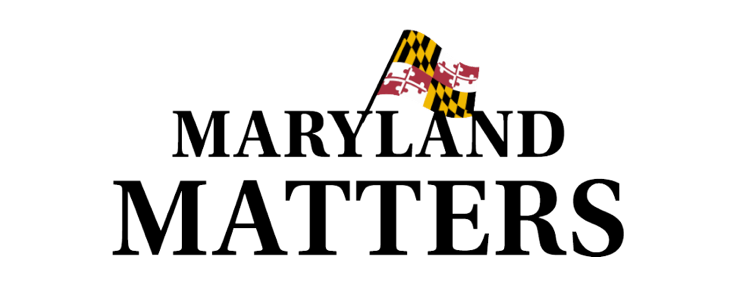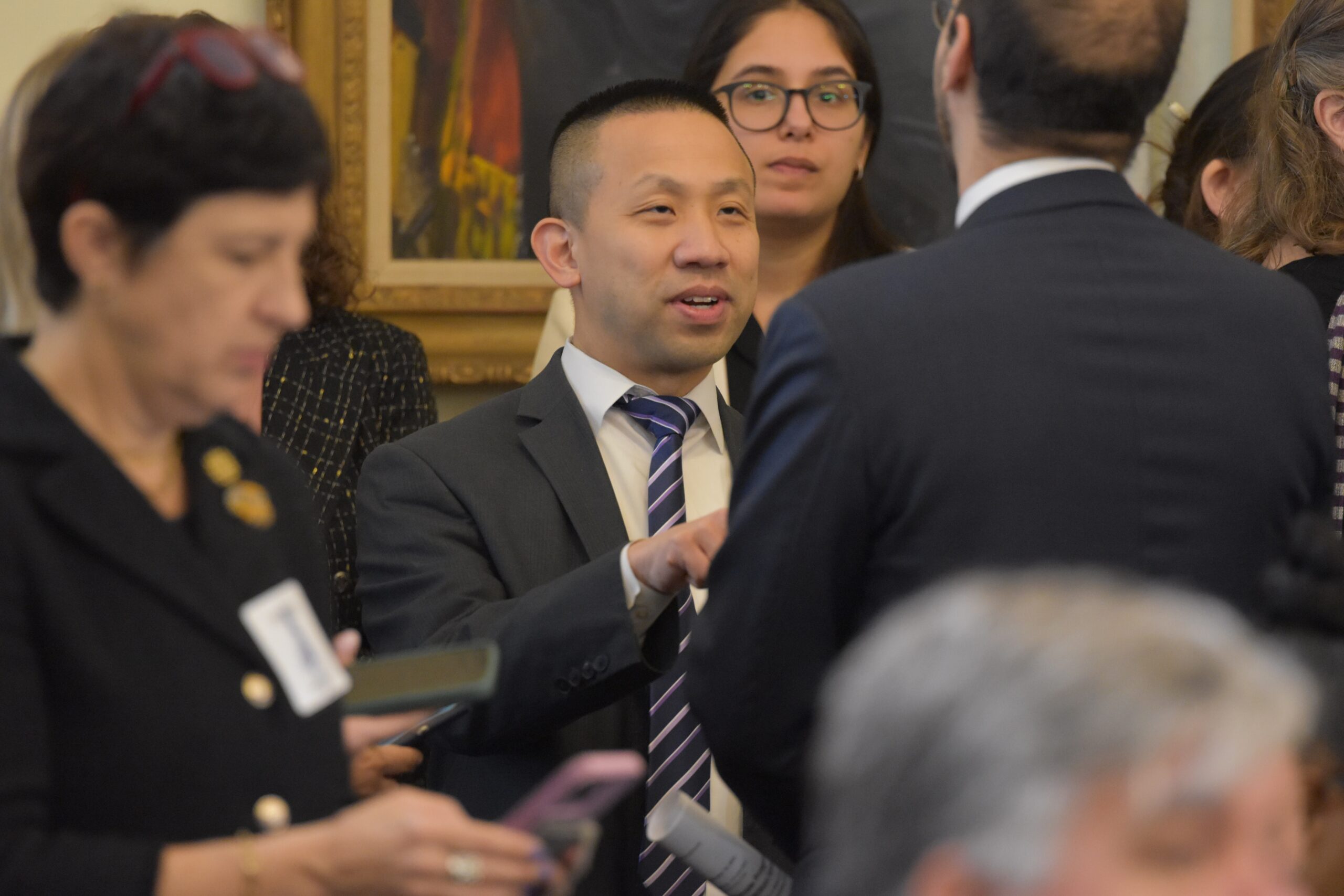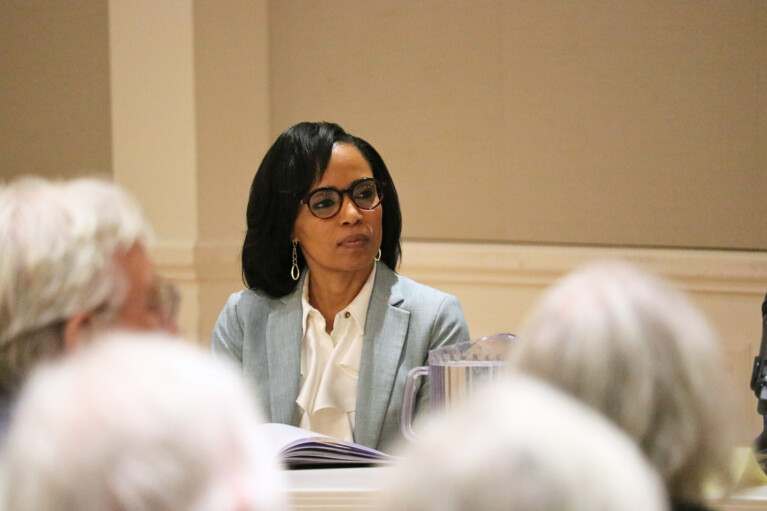Bills on the Move: Procurement Reform, Local Tax Rates, Transit Funding, Balloons

Maryland’s Senate gave unanimous approval Thursday night to a bill that would reform emergency procurements in the wake of controversial multi-million-dollar deals struck by the Hogan administration during the COVID-19 pandemic.
Its final approval of House Bill 1091, sponsored by Del. Kirill Reznik (D-Montgomery), came after a short debate.
The bill sets new rules for emergency procurements and requires additional reporting. Under Senate amendments that must still be considered by the House of Delegates, state officials would have to attempt to get at least three verbal quotes before awarding an emergency contract and evaluate bidders based on how long they’ve been in business and their history with government contracts, among other factors. The bill would also require a written contract for such procurements and allow for emergency review by the Board of Public Works.
Sen. Clarence K. Lam (D-Baltimore and Howard), a frequent critic of Gov. Lawrence J. Hogan Jr. (R), said the bill was necessary after the release of a critical audit report on Friday that revealed the administration spent more than $11.9 million on test kits from a South Korean firm last April without a written contract or a competitive bidding process.
Lam and Sen. Paul G. Pinsky (D-Prince George’s) lamented a lack of transparency from the Hogan administration as lawmakers attempted to provide oversight of emergency purchases related to the pandemic.
Even as of Friday, Lam said, the administration still had not identified who gave final approval to the contract for the South Korean test kits.
“The guardrails on emergency procurement are very loose and very low and allow too much wiggle room,” Pinsky said. “…And unfortunately, even with some of these guardrails, they’ve been ignored.”
An audit is pending on another state deal — $12.5 million for respirators and facemasks — with Blue Flame Medical, a politically connected business that was created during the pandemic and inked problematic contracts with multiple states. Maryland and the company later settled for $6.3 million.
Sen. J.B. Jennings (R-Baltimore County) pushed back against the criticism. He urged lawmakers to remember the fear and urgency among Marylanders as COVID-19 surged through the state a year ago. He asked his colleagues to not “Monday morning quarterback” a decision made in “the fog of war.”
“The governor did the best he could at the time,” Jennings said.
Sen. Ronald N. Young (D-Frederick) attempted to strike a balance in explaining why he would support what was in front of them: “a good bill.”
“Sometimes you do things that you think are right and they turn out to be mistakes. And sometimes you do something that looks like a mistake, and it turns out to be right,” Young said. “I’m not going to judge what decision was made.”
The measure passed the Senate 47-0.
— Danielle E. Gaines
Tiered local income tax measure moves forward
A proposal to give counties more power over local income tax rates was again subject to Republican resistance in the legislature Thursday, although some conservatives showed support for the bill.
The bill, dubbed the “Local Tax Relief for Working Families Act of 2021″ would allow Maryland’s 24 jurisdictions to set up brackets for local income taxes, with a maximum rate of 3.2%. The bill would also set the minimum local income tax rate at 2.25%, matching the current rate in Worcester County, which has the lowest rate in the state.
The House version of the bill, which that chamber passed after considerable debate last month, also encountered pushback recently in the Senate, with Republicans arguing that the proposal doesn’t guarantee lower rates for low-income residents.
Senate Minority Leader Bryan Simonaire (R-Anne Arundel) made a last stand against the House version of the bill on Thursday, before the Senate approved it by a 30-17 vote.
House Republicans voiced similar concerns about the Senate version of the bill. Del. Sid A. Saab (R-Anne Arundel) said the bill’s title was misleading since counties might not lower their tax rates.
Del. Brian A. Chisholm (R-Anne Arundel County) introduced an amendment that would’ve required counties to lower the tax on lower income brackets if officials opt to increase the tax for higher income brackets, resulting in a “revenue-neutral” change.
Chisholm’s amendment was rejected after Democrats objected, with Del. Jessica M. Feldmark (D-Baltimore and Howard counties) noting that the Maryland Association of Counties had lobbied for the bill on the grounds of increasing local power over taxes.
Feldmark has defended the bill on the House floor for months, and on Friday she reiterated her point that the bill is “enabling” legislation that allows local governments more flexibility compared to the current flat rate system.
“This bill does not raise taxes,” Feldmark said. “It does not grant counties any new authority to raise taxes. There is no tax increase, or potential for a tax increase, newly created by this bill. This bill gives counties the option as they consider their local finances to provide relief for working families.”
House Majority Leader Eric G. Luedkte (D-Montgomery County) said the debate over the bill really amounted to whether or not lawmakers support progressive taxation or not.
“What this amendment does is it takes away local control, and it reduces the number of scenarios under which working people would have a lower tax rate than wealthier people,” Luedtke said of the Republican amendment.
Chisholm’s amendment was rejected in a 43-91 vote before the proposal passed its second reading in the House. It could come up for a final vote in that chamber on Friday.
— Bennett Leckrone and Danielle E. Gaines
Transit funding boost passed
The House of Delegates gave final approval on Thursday to a measure intended to force the state Department of Transportation to boost spending on the maintenance of Maryland’s mass transit systems.
House Bill 114, sponsored by Del. Brooke Lierman (D-Baltimore City), was approved 101-38.
The measure grew out of a 2019 report that found a $2 billion gap in “state of good repair” funding for buses and rail cars.
The measure will mandate an additional $106 million per year be spent on maintenance between fiscal year 2026 and fiscal year 2028. MDOT had taken steps to close funding gaps in the years leading up to FY 2026 in the face of public criticism.
Transportation advocates said the state’s failure to engage in proper upkeep was responsible for system delays. Unreliable transit is especially detrimental to lower-income workers, students and seniors who rely on it, advocates have maintained.
“This is an important step by the legislature and as long as MDOT prioritizes fixing what we have before widening roads or adding capacity it should be easy to comply,” said Brian O’Malley, head of the Central Maryland Transportation Alliance.
“For Marylanders it will mean safer, more reliable paratransit, bus and train service to get people to jobs and other places they want to go in their daily lives.”
Companion legislation, Senate Bill 199, backed by Sen. Cory V. McCray (D-Baltimore City), was approved in that chamber 38-9 late last month.
— Bruce DePuyt
Balloon release ban headed to governor
Marylanders may no longer be allowed to let balloons loose into the sky, after the General Assembly passed a bill banning intentional releases.
Sponsored by Del. Wayne Hartman (R-Lower Shore), the bill prohibits any state or local organization, entity or person older than 13 from “intentionally releasing…a balloon into the atmosphere,” with minimal exceptions. It also puts in place a fine for those who violate the law.
The purpose of the bill is to reduce the hazards and pollution caused by free-floating balloons.
Balloons have been known to end up miles from where they were released, and hurt or even kill the animals they come in contact with.
“Best case scenario it becomes litter, oftentimes it’s much worse,” Hartman said during a January bill hearing. “Oftentimes they land in the waters — in the ocean, the bays and so forth. Unfortunately, these are often confused as food for sea life, and the ribbons and so forth attached can cause entanglement. So the outcome is often fatal for the marine life.”
In November of 2020, Oceana, an international ocean conservation organization, documented 1,792 cases of plastic consumption or entanglement in sea turtles and marine mammals across 21 U.S. coastal states between 2009 and 2018. Balloons were cited as the fourth most identifiable plastic to cause incident, most frequently related to ingestion by sea turtles.
If signed, the bill would go into effect on Oct. 1.
Queen Anne’s, Montgomery and Wicomico counties, as well as the Town of Ocean City, have already enacted similar legislation.
— Tori Bergel, Capital News Service




 Creative Commons Attribution
Creative Commons Attribution